|
|
|
Sort Order |
|
|
|
Items / Page
|
|
|
|
|
|
|
| Srl | Item |
| 1 |
ID:
158410
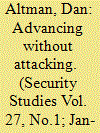

|
|
|
|
|
| Summary/Abstract |
What is the nature of the strategic game that states play during crises? Extensive research examines the leading answer: coercive bargaining. States prevail by signaling resolve, establishing the credibility of their threats, and coercing their adversaries into backing down. However, instead of (or in addition to) traditional coercive bargaining, this article shows that states frequently play out a different game with its own set of rules and tactics. The article explores how states outmaneuver their adversaries: working around their red lines, taking gains by fait accompli and imposing pressure where it is possible to do so without quite crossing the line of unambiguously using force. Based on this premise, the article develops a theoretical framework for understanding strategic interaction during crises, referred to as advancing without attacking, and shows that it best explains the course of the Berlin Blockade Crisis of 1948–49 while also shedding light on other prominent crises.
|
|
|
|
|
|
|
|
|
|
|
|
|
|
|
|
| 2 |
ID:
138806
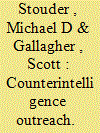

|
|
|
|
|
| Summary/Abstract |
Following the passage of the Counterintelligence (CI) Enhancement Act of 2002 1 U.S. government agencies that conduct CI have sought to increase collaboration with the public, other organizations and businesses, through partnerships and alliances. Despite these successes, CI personnel may underestimate what they have to offer to interested third parties who could become critical allies. Hence the question: How should CI outreach be conducted and shaped in order to create a strategic CI advantage? Correlative questions include: Should outreach operations and networks stay the same, evolve slowly, incrementally, or naturally over time, or be radically altered? How might current outreach programs be re-configured or deployed in order to meet evolving intelligence threats, operations, and challenges? While law enforcement has its informant networks, and traditional intelligence agencies often focus on managing their case load of assets, CI organizations may lack a strategically assembled network of support. Yet, organizations can evaluate their outreach operations and clients and then calibrate their network of relationships to enhance effectiveness and create a durable advantage over their adversaries.
|
|
|
|
|
|
|
|
|
|
|
|
|
|
|
|
| 3 |
ID:
161184
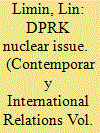

|
|
|
| 4 |
ID:
133407
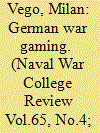

|
|
|
|
|
| Publication |
2012.
|
| Summary/Abstract |
The article discusses the German military's historical use of war gaming, with particular focus given to the early-20th century and World War II. The author begins with a brief general history of war games, beginning with those ancient Gupta Empire in India. The war games implemented by German Field Marshal Alfred von Schlieffen at the turn of the 20th century in anticipation of an invasion of France are described, with emphasis given to their focus on informing subordinate officers of Schlieffen's plans. The educational nature of interwar German war games, especially those of the Reichsmarine (German Navy) is explained. The differences between tactical and strategic games are also explored.
|
|
|
|
|
|
|
|
|
|
|
|
|
|
|
|
| 5 |
ID:
122304
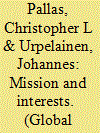

|
|
|
|
|
| Publication |
2013.
|
| Summary/Abstract |
International advocacy campaigns allow the concerns of disadvantaged groups in developing countries to reach policymakers. However, recent research has challenged the motivations of the Northern nongovernmental organizations involved and raised concerns about the impacts of North-South NGO partnerships on Southern NGO control. This article addresses these concerns by developing a typology of NGOs based on their financial incentives and the rigidity with which they adhere to their established organizational mission. It then models interactions between NGOs of different types as a strategic game. In the game, NGOs decide whether to enter international campaigns and, if so, manage campaign function to maximize payoff. "Participation-oriented" Northern NGOs, whose supporters reward them for undertaking advocacy, were found to run lengthy but ineffective campaigns and focus on publicity. "Outcome-oriented" groups, whose supporters reward them for measurable achievement, were found to generate higher campaign intensity but exit after either early victories or costly difficulties. The model is illustrated with a comparative analysis of two different campaigns regarding the Narmada Dam project.
|
|
|
|
|
|
|
|
|
|
|
|
|
|
|
|
|
|
|
|
|